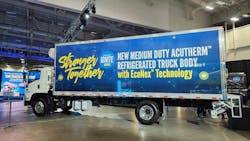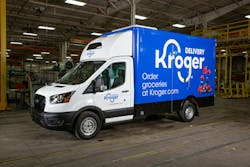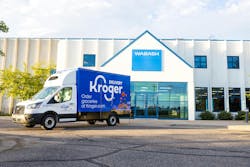Transportation firms face constant pressure to improve sustainability. With Wabash’s new composite technology, the next big leap forward in temperature-controlled transport efficiency is in the structure of the refrigerated truck body.
“The market has not seen a new way of constructing refrigerated truck bodies for half a century,” Kevin Sumrak, senior director of sales and truck body strategy for Wabash, told Refrigerated Transporter. “That’s why it’s something that’s really revolutionary in the refrigerated market today.”
At the 2024 Wabash Ignite conference in Louisville, the manufacturer displayed a medium-duty truck with the composite material: the Wabash Acutherm refrigerated freight body with EcoNex Technology. EcoNex, the company’s proprietary technology, replaces conventional refrigerated truck body construction using what Wabash says is a lighter and more thermally efficient build.
One material, two functions
The truck body’s EcoNex panels offer an independent structural integrity, which is a key benefit.
Traditional refrigerated bodies need metal posts in the walls for structural support, leading to less-consistent temperature control across the body.
Each metal post, less insulated than the rest of the body, brings a significant change in temperature for specific points in the body. With the composite panels using EcoNex technology, metal posts are not necessary.
“There are so many fewer spots where you have that drastic change in temperature profile,” Clickenbeard explained. “You have a much more consistent temperature profile across the body.”
Reduced moisture intrusion
The tight composition of a truck body using EcoNex panels also means less water intrusion, according to Wabash.
The construction of the composite panels, including the composite’s protective gel coating, introduces fewer voids in the body. The panels are then significantly less likely to absorb water over the life of the asset, Sumrak said. Less moisture intrusion translates to greater comparative thermal efficiency as the body ages.
Energy savings
Greater overall thermal efficiency means that fleets can spend less energy powering transport refrigeration units.
Energy savings for the body also go beyond TRU use. With a lighter overall weight compared to traditional bodies (about 700 lb.), the medium-duty truck body using EcoNex panels requires less fuel or energy to move.
With the onset of electric vehicles, limited range makes energy efficiency crucial, and heavy batteries make lightweight builds advantageous.
“It’s great for ICE engines, and I would say it’s even better for electric vehicles,” Sumrak said.
EcoNex panels in action
Kroger embraced the panels’ effectiveness in one of the technology’s biggest single commercial application so far. The grocery giant runs hundreds of refrigerated truck bodies using EcoNex Technology on light-duty trucks.
The companies’ partnership started with a traditional RFP process. Kroger was seeking refrigerated truck bodies uniquely designed to fit its standards for weight, size, and thermal efficiency. At the time of the RFP, Kroger implemented a unique automated distribution model from Ocado. The refrigerated body needed to be effective but also sized according to the bins utilized in the Ocado model.
“The truck body that they were looking to purchase was very much developed around that technology,” Sumrak explained. “The intent was to have a very specific use case for these commercial vehicles.”
Weight reduction and thermal efficiency were both key factors for Kroger.
“And that’s really where EcoNex Technology shines,” Sumrak said. “It really fit the bill for this exact use case that Kroger had.”
Rapid development
Once Kroger chose Wabash, the manufacturer developed the refrigerated truck body very quickly.
“It’s probably one of Wabash’s greatest product development stories, to be honest,” Sumrak said. “From acceptance of the RFP by Kroger to the pilot phase and getting into production, it took us about eight months.”
Kroger runs the truck bodies on Ford Transits and E350s. The truck body interior provides precise space for bins of produce and maintains two different temperatures: 60 degrees Fahrenheit in the back and 32 degrees in the front. Today, Kroger’s automated facilities support direct home grocery deliveries in multiple states.
Kroger continues to grow its distribution centers and delivery service across the nation. According to Sumrak, Wabash produces hundreds of the refrigerated units per year to build Kroger’s fleet.








